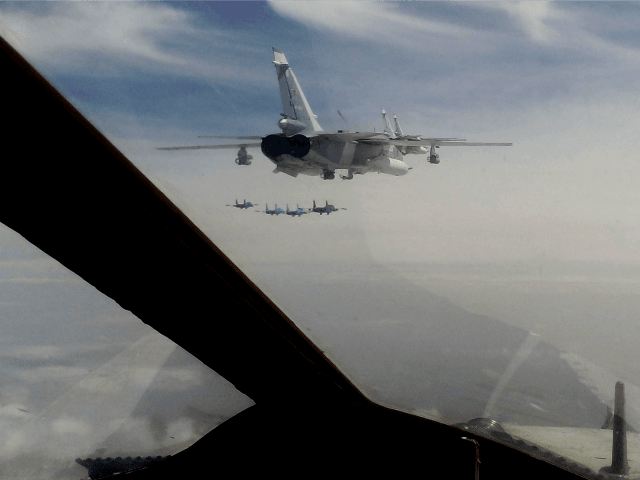An “unprecedented” nearly 24-hour bombing offensive by Russian forces that began Wednesday in support of Iran’s narco-terrorist proxy Hezbollah and other ground forces fighting on behalf of dictator Bashar al-Assad in southern Syria has reportedly prompted rebel fighters to resume peace talks and surrender more than 30 towns.
On Thursday, the U.K.-based Syrian Observatory for Human Rights, which uses a network of ground sources to monitor the fighting, reported that there had been 600 airstrikes in 15 hours, extending into the wee hours of Thursday.
“From last night until now, Russian airplanes are pursuing a scorched earth policy,” Hussein Abazeed, spokesman for the joint rebel command for the south, told the Agence France-Presse (AFP) agency on Thursday.
After negotiations between Russia and the rebels to end the Assad’s offensive to retake southern Syria’s Daraa province collapsed on Wednesday, the Kremlin renewed its assault, unleashing a wave of airstrikes in support of ground troops participating in the regime’s operation that began June 19.
Russian- and Iranian-backed Assad troops intend to seize Syria’s southwest region, considered one of the last strongholds held by rebels, including the Turkey-allied Free Syrian Army (FSA) and the Islamic State (ISIS/ISIL) to a lesser extent.
On Thursday, Hussein Abazeed, spokesman for the rebels’ southern operations, told AFP that “talks will resume.”
Jordan, which has been working as a mediator between the rebel forces in southern Syria and the Russian military, confirmed that the warring parties have agreed to resume suspended talks.
On Thursday, Jumana Ghunaimat, a spokesperson for the Jordanian government, said, “Jordan’s efforts succeeded in convincing the negotiating parties to meet again” to reach a truce and political solution, Reuters reported.
Ibrahim Jabawi, an opposition spokesman, reportedly noted that the meeting with Russian officers is expected to take place Friday.
The renewed bombing came after four days of reduced airstrikes linked to the failed negotiations. According to the United Nations, the fighting has displaced more than 320,000, with 60,000 of them gathered at the border crossing with Jordan, which continues to be sealed off.
U.N. officials have urged an immediate end to the fighting, pleading with Jordan to open its border.
After nearly 24-hours of heavy Russian airstrikes as Assad regime forces advanced on the ground, the rebels are reportedly ready to talk again.
AFP reports:
After retaking large parts of the country with Russia’s help, regime forces set their sights on the southern provinces of Daraa and Quneitra, bordering Jordan and the Israeli-occupied Golan Heights. Moscow has been brokering talks with rebel towns for negotiated surrenders in a carrot-and-stick strategy that it and the regime have used to retake other territory, including the Eastern Ghouta region near Damascus earlier this year. More than 30 southern towns have already agreed to surrender, expanding the regime’s control of Daraa province to more than 60 percent, double what it held before the offensive.
Although the United States and Israel have called on Russia to keep Assad’s Iranian allies, namely Hezbollah, away from southern Syria, the Shiite terrorists are helping led the offensive, Reuters noted.
“Hezbollah is a fundamental participant in planning and directing this battle,” an unnamed commander in the regional alliance that backs Damascus told Reuters. “Everyone knows this – the Israeli enemy, friends, and even the Russians.”
Nevertheless, Reuters acknowledged that “the Iranian-backed group is keeping a lower profile than in past Syria campaigns, acknowledging the risks of [an] Israeli escalation.”
Support from Iran and Russia has been critical to Assad retaking control of most of Syria.
While southwest Syria is a “de-escalation zone” agreed last year by Russia, Jordan, and the United States to reduce violence, the American military has not responded to violations of the deal.
The U.K. Observatory has tallied nearly 150 civilian fatalities since the Assad assault in southern Syria began last month.

COMMENTS
Please let us know if you're having issues with commenting.